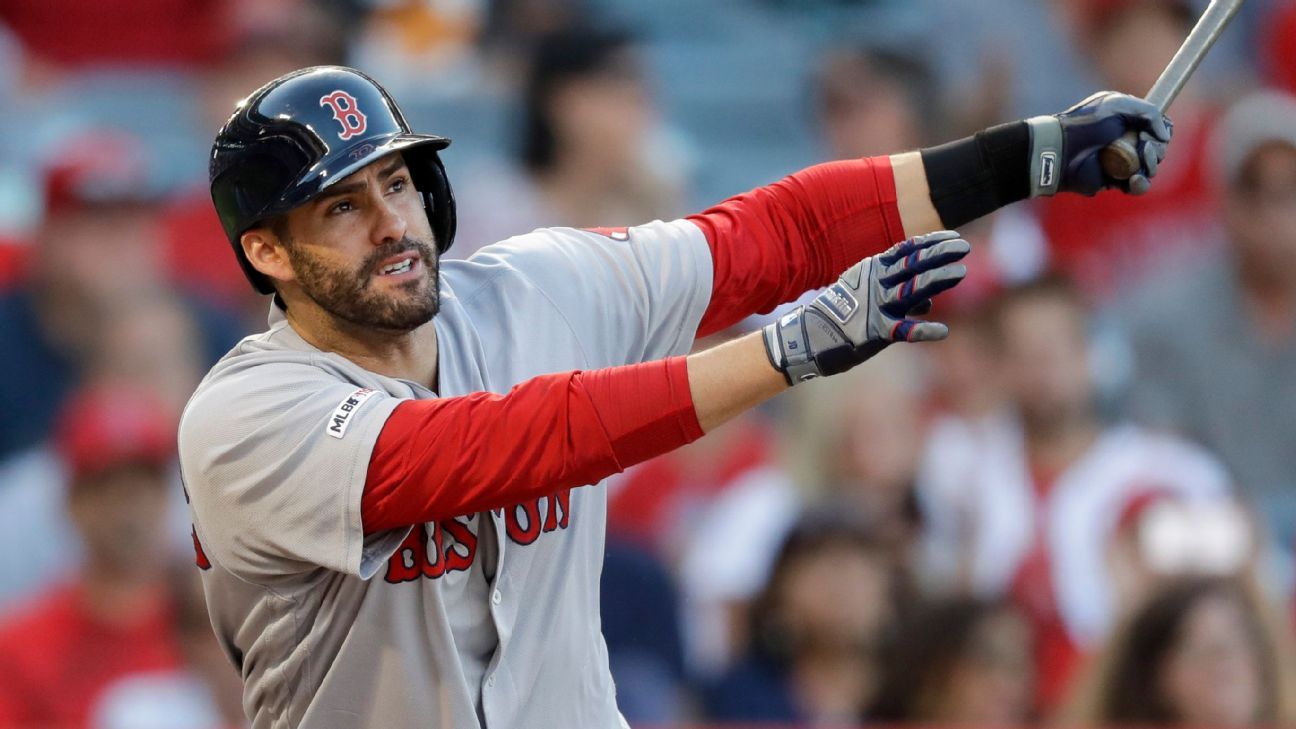
The first domino in a long and complicated offseason fell for the Red Sox on Monday, as slugger J.D. Martinez decided not to test free agency, meaning Boston's biggest run producer in recent years will be back for at least one more season -- presuming he isn't traded first.
Questions about the designated hitter's future loomed for months dating back to the summer, and they heated up when Boston began falling out of playoff contention. Martinez, 32, has three years and $62.5 million left on his contract, putting Chaim Bloom, Boston's new chief baseball officer, in position to make the first major decisions of his tenure, with the ramifications of Martinez's decision generating ripple effects throughout the organization.
A major theme of Boston's offseason is owner John Henry's publicly stated desire to reduce the team's payroll under next year's luxury tax threshold of $208 million. The Red Sox led the majors in payroll the past two seasons, which includes their World Series title run in 2018.
Here are a few questions Martinez's opt-in raises:
What did Martinez decide and why?
Martinez negotiated the ability to opt out of his contract before each of the last three seasons of the five-year, $110 million deal he signed before the 2018 season. With Martinez opting in, at least for one more season, Boston retains one of the elite sluggers in baseball, one who has hit 317/.392/.593 with 79 homers, 70 doubles and 235 RBIs in 296 games the past two seasons. Still, those luxury tax issues remain.
Boston owes Martinez $23.75 million for 2020, and will likely face the same opt-out dance next offseason, when Martinez can once again test free agency. Martinez's entire $23.75 million salary will count against Boston's luxury tax bill, versus his average annual salary of $22 million because the final two years of the slugger's contract are conditional on health.
Why is it good or bad for Boston -- and what impact does it have on Mookie Betts?
What will the Red Sox do with Mookie Betts?
Jeff Passan and Keith Law discuss the tough dilemma facing the Red Sox this offseason: Will they keep Mookie Betts or trade him for more pitching?
Martinez's decision to stay shifts the direction of Boston's offseason. Bloom could look to trade Martinez, a move that would save more money for the organization than an opt-out would have, since there'd be no $2.5 million buyout involved. Bloom could also look to make the difficult decision and explore a trade for Mookie Betts, although any decision to trade the four-time Gold Glove outfielder and 2018 AL MVP would likely be for cents on the dollar and mean trading the most popular active athlete in Boston whose name isn't Tom Brady. Betts is entering the final season of his contract with the Red Sox, primed to make around $30 million in 2020.
Bloom could also explore the trade market for the team's starting pitching, with Chris Sale's five-year, $145 million extension kicking in at the start of 2020, Nathan Eovaldi owed $68 million over three years and David Price on the payroll for another three years and $96 million. All have injury concerns of varying degrees, though a recent report from the Dallas Morning News suggested the Texas Rangers have had internal discussions about pursuing a Boston starter via trade.
What is the No. 1 priority for Boston now that Martinez is back?
Regardless of whether or not he stayed, Martinez was not going to be the No. 1 priority in an offseason where Boston's two other biggest quandaries -- figuring out Betts' future and the luxury tax situation -- dominate. Had Martinez opted out, Boston likely would have let their cleanup hitter walk in free agency, given the plethora of bats on the open market who would cost less and still produce runs.
Still, the impact of Martinez's bat in the middle of Boston's lineup can't be overstated. Following the retirement of David Ortiz, who hit .315/.401/.620 with 38 homers and 48 doubles in his age 40 season, Boston slid Hanley Ramirez into the DH slot in 2017, where he hit .242/.320/.429 with 23 homers, while the top of the lineup took a step back. Betts hit .264 a season after finishing as MVP runner-up and Xander Bogaerts hit just 10 homers in 148 games. Martinez has locked down the middle of the lineup, and in 2020, Boston will look for increased production from Andrew Benintendi, while others, like Rafael Devers and Bogaerts, will need to maintain their outputs from their breakout 2019 seasons.
But Boston's highest-profile priority remains the future of Betts in Boston. Bloom didn't tip his hand in regard to Betts or Martinez during his introductory news conference, but he echoed the message of ownership, which wants to build an organization that emphasizes the long view.
"I would say generally, our top priority is going to be sustainability and competitiveness over the long term," Bloom said. "And that could take many forms, but that's really going to be the top priority as we think about moves. With respect to those two guys, I'm just coming in here and there's a lot that I don't know, and I'm looking forward to building relationships with them and learning a little bit more about them from everybody here."















 Phone: (800) 737. 6040
Phone: (800) 737. 6040 Fax: (800) 825 5558
Fax: (800) 825 5558 Website:
Website:  Email:
Email: 






